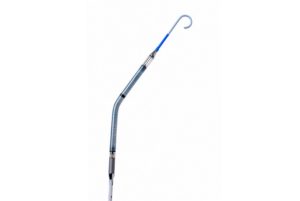
Use of the Impella CP (Abiomed) micro-axial flow pump in the treatment of patients with ST-segment elevation myocardial infarction (STEMI) complicated by cardiogenic shock increased the rate of survival at six months compared to standard care alone, results of the DANGER-SHOCK trial have shown.
According to investigators, this is the first trial “in a very long time” to produce a positive result for the management of cardiogenic shock and represents a new treatment option for patients—though they caution that there are risks associated with this approach, and that it may not be generalisable across all risk groups.
Results of the trial were presented by the study’s lead author, Jacob Møller (Odense University Hospital, Odense, Denmark) during a late breaking trial session at the American College of Cardiology (ACC) 2024 scientific session (6–8 April, Atlanta, USA) and published simultaneously in the New England Journal of Medicine (NEJM). “I think this will be a routine device that will be used in these desperately ill patients,” Møller said of the trial’s findings.
Previous trials evaluating the potential benefits of this and other heart pumps for cardiogenic shock have had mixed results. DANGER-SHOCK is the first trial powered to examine whether the use of the device can improve survival in STEMI complicated by cardiogenic shock.
Investigators enrolled 360 patients treated for STEMI with cardiogenic shock at 14 centres in Denmark, Germany and the UK. Patients who suffered out-of-hospital cardiac arrest with coma and increased risk of brain damage were excluded from the trial.
Researchers randomly assigned patients to receive standard care or standard care plus treatment with an Impella CP pump. Participants were randomised before, during or up to 12 hours after receiving treatment in the cath lab, depending on when cardiogenic shock was diagnosed.

Among 355 patients who were included in the analysis, 58.5% of those who received standard care alone and 45.8% of those who received the Impella pump had died at six months after randomisation; there was a 13 percentage point absolute reduction in the rate of death, the study’s primary endpoint, in favour of the device.
Furthermore, the results showed a reduction in a composite endpoint of additional mechanical heart support, heart transplant or death among patients who received the heart pump, but there was no difference between the two groups in the number of days out of the hospital.
“What was a surprise for us was that the benefit seems to persist beyond 30 days,” Møller said. “It’s not only that we are saving lives, it looks like we are also saving myocardium so the patients keep surviving, and the survival curves continue to separate beyond the first 30 days.”
However, the results also showed significantly higher rates of complications among patients who received the heart pump, including bleeding, limb ischaemia, renal replacement therapy and sepsis.
“It doesn’t come without a cost—we see significantly more serious complications in the Impella treated patients,” Møller said. “Overall, we have more complications, but we also save lives.”
Møller said that the study is not generalisable to all cases of cardiogenic shock as the trial was more selective than previous trials in identifying patients who were most likely to be able to benefit from the use of a heart pump, for example, by excluding those with a risk of brain damage.
However, within this patient population, he said the results are likely translatable beyond northern Europe to large centres with the necessary expertise to employ the device.
Subg-roup analyses suggested that patients with very low blood pressure and those with lesions in more than one coronary artery may see a greater benefit from the Impella pump.
Møller said that further studies are needed to assess the benefits in more diverse patient populations and to examine how the duration of mechanical support might affect the rate of severe complications and identify opportunities to further optimise practices to minimise complications.
In a statement issued following the presentation of the trial’s results Abiomed’s chief medical officer, Chuck Simonton, welcomed the findings. “We congratulate Dr Møller and the independent group of investigators who initiated and completed this landmark trial,” Simonton said. “What impresses me most is that the significant survival benefit with Impella, compared to the control arm, improves over time.”
Abiomed was acquired by Johnson & Johnson in December 2022, and operates as a standalone segment within Johnson & Johnson’s medtech segment.










